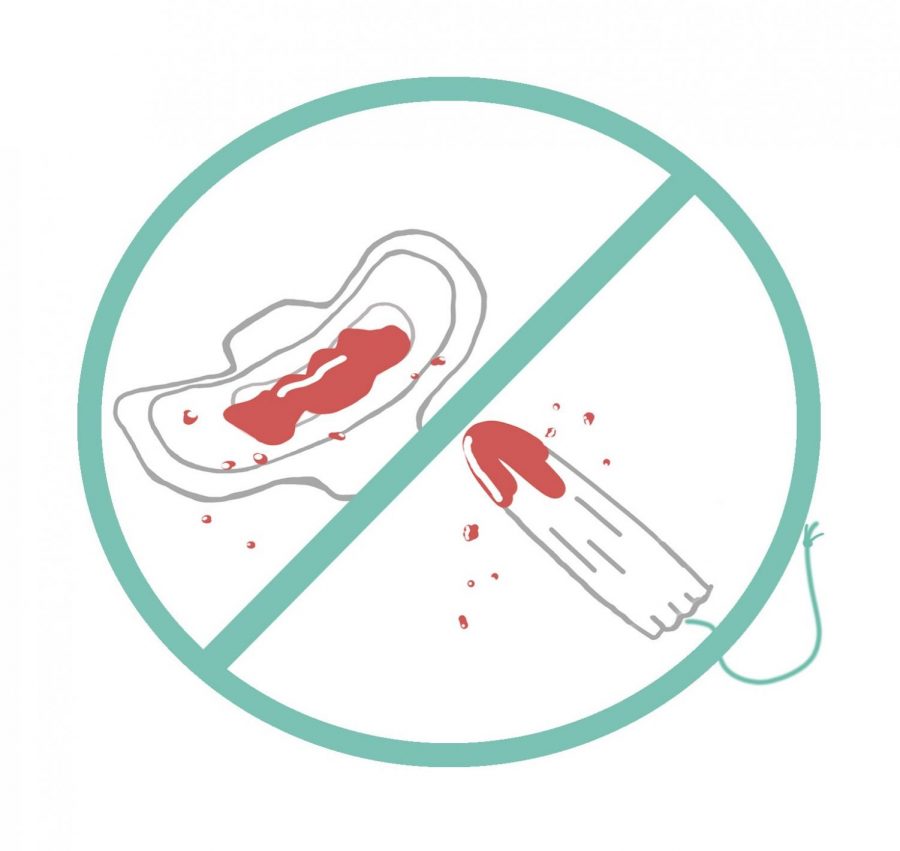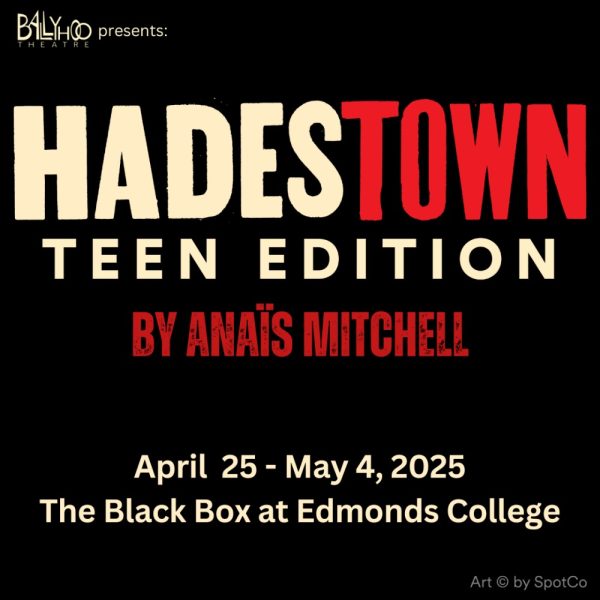The Hidden Bloodshed of EdCC
Lack of Accessibility to Menstrual Products has Impact on Education
Recently a fellow student began whispering to me in class, recalling her tale of woe. She described her quest to find one thing: a tampon.
That morning she had gone to three bathrooms in search for a dispenser, and I was the third person she had asked. I myself had many similar stories, but unlike her, I never felt the slightest bit comfortable even whispering such a request. I have been socialized to not voice my ideas and problems- that my needs have less value, and they’re not worth rocking the boat. For years I, and so many others, have suffered behind closed bathroom doors, not voicing our problems for fear of ridicule.
Approximately half of the student population spends a fourth of every month on their period. Many of them will know the struggle of finding a pad or tampon in a public place, rummaging through their bags for spare change, and trying in vain to get one out of the bathroom dispensers that will ultimately take their money without a reward.
Armed with a slurpee, a roll of coins, and a bleeding vagina, I set out to learn just how accessible menstrual products are on Edmonds Community College’s campus. Initially, I just wanted to learn the true number of machines that would actually give me a menstrual product of some kind. However, three miles and dozens of flights of stairs later, I have learned that you would be hard pressed to find a bathroom with the option at all.
Of the 35 women’s and gender neutral bathrooms that I could find on the main campus, only three had dispensers. These three were all found in Snoqualmie Hall, and neither side of any of them were functioning. Additionally, two of them cost 10 cents, where as the one on the third floor was 25 cents. I unfortunately lost two quarters to the third floor.
In an attempt to at least get these three machines functioning, I requested that they be repaired. In response, Stephanie Teachman, Executive Director of Facilities, explained that “we had to discontinue this convenience many years ago due to repeated theft and vandalism,” and that custodial will be putting up signs on machines to notify people that they are no longer in use. At the time of publication those signs are currently up, and list a few places on campus where period
products can be acquired, however, these signs have only recently been put back up, and only in
some bathrooms.
In an informal survey conducted by The Triton Review of EdCC community members, over half of respondents were
unaware that menstrual products were not available in bathrooms on campus. I found solace in the Wellness Center on the second floor of Lynnwood, which has a bowl of free tampons. Additionally, the school’s bookstore does have a small amount of pads in stock, and you may be able to snag some from the food pantry. But the fact is, a shedding uterus is not going to stop for someone to walk across campus, or their education, but their education does stop for menstruation.
Coincidentally, while searching for answers and a tampon, “Period. End of a Sentence.” was winning an Academy Award for best short documentary. The film highlights how girls in developing countries often do not have access to menstrual products, which increases the stigma around menstruation and hinders their ability to attend school and receive an education. The introduction of accessible menstrual products not only allowed more girls to stay in school, but gave them greater agency over their lives.
There has been a stigma around periods for centuries, and it is important to counter that stigma by having open conversations around menstruation, rather than it being hidden in our bathrooms. However, taking menstrual products themselves out of the bathrooms does the exact opposite, it reinforces the stigma.
83 percent of those who responded to our survey requested to remain anonymous, likely due to the stigma surrounding periods. This is one of the ways in which the “Period. End of A Sentence” mirrors the present state of menstrual products on EdCC’s campus. Despite being anonymous, these community members had a lot to say.
The limited availability of these “conveniences” can make or break someone’s education. While they are available in approximately four areas of the school, none of these places are open evenings and weekends. This makes them inaccessible to students unable to attend day classes.
“There is no way for students to access these products, particularly on weekends,” several teachers noted that students were forced to miss their classes due to not having a pad or tampon when they needed one. “On weekends, students have had to leave class and campus to get them.”
Having to leave campus to go home to get a pad or tampon, or to a store to purchase them, means missing valuable class time, potentially lowering their grades. This not only disrupts a single person’s education, but the rest of the students’ as well, assuming they can afford them at all.
Two EdCC staff members explained that they could not afford to buy menstrual products for themselves, one of them being a teacher. Homeless and other low income students and staff may not be able to purchase menstrual products at all, and this will make it difficult to concentrate on their school work and job, impacting their ability to have a successful education. This not only is a disservice to them, but to their children, other people who rely on them,
and the greater EdCC community as a whole. 85 percent saw the lack of access to menstrual products as an equity issue, with many concerned that it makes our campus unwelcoming, or even unsafe, to menstruating students.
“Access to menstrual products on campus may affect people differently based on whether they menstruate, based
on their income or socioeconomic status and personal access to those supplies by other means, and likely based on other factors as well (gender-identity status, for example),” wrote one anonymous teacher. “The hospitality of our environment and facilities to these parties may differently affect access to education by these members of our community.”
They went on to explain that “if one person has a negative experience as a result of lack of basic hygiene supplies availability in our campus restrooms, they may choose to take their valuable contributions elsewhere, and that’s one voice removed from our collective dialogue. I want all to feel welcome here at EdCC.”
Some have questioned if it is really the college’s responsibility to accommodate menstruation. If EdCC really believed that they should only provide what they are responsible for, they would only be providing education, nothing else. But
that is not the case. The college provides students with numerous things to aid in their education. Just last week the quarterly de-stress day was hosted in the Brier lobby, which included free massages and bubble wands. The college also provides a lactation room, as well as baby changing tables in bathrooms, because they feel that it is important to provide accommodations for students and staff with babies. Considering our track record for being accommodating,
something as common as menstruation should be addressed.
“This is an underlying issue we haven’t looked at yet,” said Alice Duong, Executive Officer of Academics, when
The Triton Review staff brought the issue to the Executive Board meeting that was held on Mar. 6.
Even though menstrual products have not been present in our bathrooms for many years, numerous people have stayed silent about it. However, it is clear that many people who do not speak out about the subject have issue with it. In many ways it is taking students out of the classroom, and creating an unwelcoming environment. It might not be possible to bring menstrual products back without issue, but one thing is clear: not having them is reinforcing the
stigma. Despite this, the EdCC community is still ready, willing and able to offer solutions to the issue that work for everyone.
One teacher suggested that “The products should be free. Perhaps make it so you need to run your EdPass through a reader to get access,” another stated that “there could be stashes throughout campus that those in need can request from, and signs posted in the bathrooms about where they could be accessed.” If only there was an empty vending machine, conveniently fitted with an EdPass reader, somewhere on campus… [See “Empty Vending Machine Continues to Plead for Death“]
“I think it’s something we should definitely deal with and I would like to make a change,” said Marc Rayner-Payne, Executive Officer of Clubs. The Triton Review has agreed to share the responses to our survey with the Executive Board- with names redacted- and will continue to work and report on this issue in collaboration with the board members, in order to find a solution that works for our campus.
Until then, menstrual products can be found occasionally in the the food pantry, bookstore, Diversity and Wellness Centers at varying times throughout the week.











Chelsea Nesvig • May 14, 2019 at 10:50 am
Hello – I am a librarian at the UW Bothell/Cascadia College Campus Library who works at the EdCC Library some Saturdays. I found a copy of The Triton Review last week and read this article. There are clearly a lot of gaps that EdCC needs to fill to meet the needs of menstruating students. I thought I’d share that over at UWB/CC we recently had free pads and tampons installed in bathrooms. See a photo of one of the library bathrooms: https://www.screencast.com/t/h0nWxTAr – theft has thankfully not been an issue – perhaps part due to the request to “only take what is needed in order to sustain this service” but perhaps also the fact that many students are grateful this got implemented and do not want to see it go away.
If you wanted to reach out to facilities on this campus and ask about how implementation of this program worked, their contact info is: [email protected] or 425-352-5466.
Please reach out to me if you have other questions. Thank you for your reporting!
Sierra Buckley • May 16, 2019 at 12:56 pm
Hi Chelsea,
I’m excited to hear that our paper is making its way into the community, as well as that other campuses are taking steps to tackle this issue!
We are currently working with our student government to bring menstrual products to our campus, so I will forward your message to them!
Thank you for reading and taking the time to comment,
~Sierra Buckley